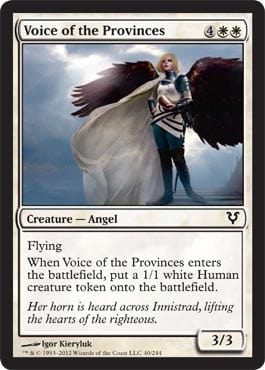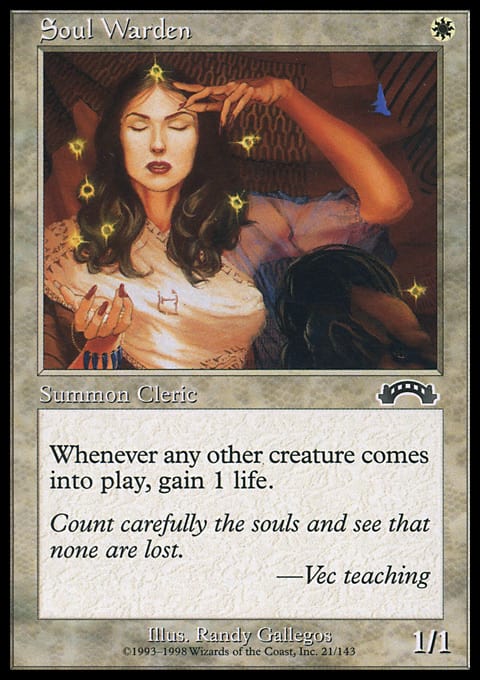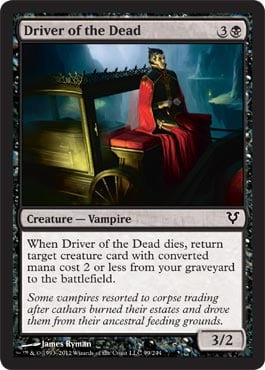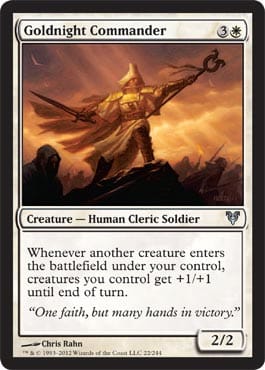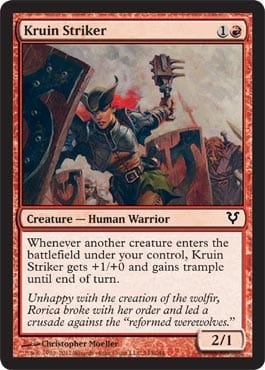Back in April, there was a major change to the Magic Infraction Procedure Guide (IPG). For those of you who don’t know, this change stated that players are no longer responsible to remind their opponents of their missed triggers at Competitive and Professional Rules Enforcement Level (REL) events. As a player, this was a great thing. I no longer had to stop the game, call a judge, and tell him that my opponent forgot to put a counter on his Shrine of Burning Rage. Now if my opponent forgets it, then oh well, no counter for him.
There are a few glitches in these new rules, and I’m going to talk about them today. I feel that they are so complicated that even the judges are unsure of how they work. Here’s one example.
Out of Order Sequencing
I played in Grand Prix: Malmo last month. In one of my matches, I tapped six lands, cast a Voice of the Provinces, and then in one quick motion, I said “go” and put a token into play. Well, since I said “go,” and then put a token into play, this was a problem for my opponent, who immediately called the judge. It was ruled that I missed the trigger, and I was not able to have the token.
This weekend, at Grand Prix: Vancouver, the exact same thing happened. In one quick action, my opponent cast Voice of the Provinces, said “go,” and put the token into play. Of course, since I already knew how this worked from Malmo, I called the judge; however, the ruling he gave was different. Since my opponent did this series of events in one motion, it was ruled that he performed out of order sequencing, and he was able to keep the token. I appealed the ruling, since this had already happened to me before and was ruled the other way, but the head judge upheld the ruling, and the token stayed in play.
When I went home, I looked up the ruling in the IPG, and sure enough, what happened was out of order sequencing, which meant that not only did I receive an incorrect ruling from a judge in Malmo, but I also looked like a jerk when I called the judge on my opponent in Vancouver.
What this means is that since these rules are still new, judges will make mistakes, but the judges have to be consistent with their rulings. I received two completely different rulings for the exact same thing, and that didn’t make me happy, especially because I was ruled against both times.
Lapsing Triggers
Lapsing triggers are a completely new concept to the IPG. Lapsing triggers are mandatory, but if you forget about one, the trigger is considered missed and doesn’t go on the stack. The judges’ philosophy was basically this: Magic is a game of skill, and players have to be aware of the game state. Remembering your triggers should be a skill tester, and therefore, if you are unable to remember your trigger, that’s your problem.
Lapsing triggers are mostly beneficial abilities, such as gaining life or putting +1/+1 counters on your creatures. Abilities that don’t benefit you, such as Dark Confidant’s ability (sure, you draw a card, which is good, but you also lose life, which is bad), are not considered lapsing, and if you miss them, they still go on the stack if it’s in the same turn cycle.1
Here’s the list of all the effects that constitute lapsing abilities, as taken directly out of the IPG:
- Causes you to gain life
- Deals damage to an opponent or causes an opponent to lose life
- Causes an opponent to discard cards
- Instructs you to look at and/or rearrange cards in a zone
- Puts cards into your hand from your graveyard or the exile zone
- Puts a permanent onto the battlefield under your control or gives you control of a permanent
- Puts counters linked to a beneficial effect (such as +1/+1 counters or charge counters) on one or more permanents you control
- Gives one or more permanents you control +X/+Y or a beneficial ability
- Untaps one or more permanents you control
- Gives you additional phases
- Exiles, deals damage to, destroys, taps, gives -X/-Y to, or puts counters associated with a detrimental effect (such as -1/-1 counters) on one or more permanents controlled by an opponent
- Instructs an opponent to exile a permanent he or she controls or put a permanent into his or her library or graveyard
Here are some examples:
When Driver of the Dead dies, it returns a creature with converted mana cost 2 or less from your graveyard to play. Returning a creature from your graveyard to play is lapsing, so if you miss the trigger, it won’t go on the stack if you remember it later.
Soulbond is a trigger that gives a beneficial ability such as flying, double strike, or +1/+1 to the paired creatures. This is considered lapsing also, so if you cast the creature and don’t announce the soulbond, it’s assumed that you chose not to pair your creatures.
Undying is a triggered ability that returns a creature from your graveyard to play and puts a +1/+1 counter on it. Both of those things are considered lapsing. However, persist returns the creature to play and puts a -1/-1 counter on it. Although returning a creature from your graveyard to play is considered lapsing, putting a -1/-1 counter on the creature is not lapsing, which makes the entire ability not lapsing. That means that if you forget to return your persist creature to play, and then you remember it within the turn cycle, it still goes on the stack!
What about Angel of Glory's Rise? It has one triggered ability that does two things: It returns all of your Humans from your graveyard to the battlefield, and it exiles all Zombies. Assume your opponent has Zombies in play. Is the ability lapsing?
Returning creatures from your graveyard to the battlefield is lapsing, and exiling creatures your opponents control is also lapsing, so the ability is lapsing, right? Wrong! The card exiles all Zombies, and it doesn’t matter whether you control any. Since exiling all Zombies is not lapsing, the entire ability is not lapsing.
Abundant Growth has a triggered ability that tells you to draw a card when it comes into play. Drawing a card is not considered a beneficial ability because sometimes drawing a card can be bad (most notably if you are about to deck yourself). If you cast Abundant Growth and forget to draw a card, as long as it’s within the turn cycle, you can call a judge, and the judge will allow you to put the trigger on the stack.
Triumph of Ferocity works the same way. Let’s say that you and your opponent both have a 3/3 creature in play. You draw a card for your turn but completely forget about the upkeep trigger. You pass the turn, and your opponent plays a 4/4 creature on his turn and says “go.” You then remember about your Triumph of Ferocity. You call a judge, who determines that since you are within a turn cycle of the trigger, it will go on the stack. But your opponent now has a 4/4 creature in play! So does that mean you don’t draw a card now? You would have drawn a card if you remembered the trigger earlier. What happens?
You will draw the card here. The game will look back to your upkeep and determine whether you controlled a creature with power either the greatest or tied for the greatest. Since you did actually meet this requirement, you will draw a card even though your opponent has a 4/4 in play now.
So, when is the trigger considered missed? If you play a soulbond creature and then play a land or declare your attackers, you’ve missed the trigger. If you play a soulbond creature and then wait ten seconds, you can still put the trigger on the stack. As long as you don’t perform another action or move to another phase after the trigger was supposed to happen, you have not missed the trigger.
One interesting thing about lapsing triggers is if your opponent misses a trigger and you call the judge, the judge will then ask you whether you want the trigger put on the stack. In most cases, you won’t want it put on the stack, such as if your opponent forgets to use Blood Artist when you are at 1 life. However, there are some situations in which you will actually want the trigger to be placed on the stack. Here’s an example.
Your opponent casts Wingcrafter and doesn‘t announce soulbond. He plays a land and then immediately remembers the trigger. It’s obviously too late to put the trigger on the stack, but your opponent calls a judge anyway. The judge then says that since it’s a lapsing trigger, it is up to you whether it goes on the stack. You have Eaten by Spiders in your hand, so you tell the judge that yes, you would like the trigger to be placed on the stack. Your opponent then pairs the Wingcrafter with his guy and attacks with it. You cast Eaten by Spiders on the Wingcrafter, and you are then able to block the creature with any of your ground guys.
Situations such as this make Magic a bit more skill-intensive, which is great for the game. However, it also means that players have to be more knowledgeable in these rules.
Other Triggers
There are some triggered abilities that require no choices to be made and have no visual effect on the game state. Some examples of this are Kruin Striker and Goldnight Commander. You don’t have to announce these triggers, and they are just assumed to resolve automatically. Again, Magic is a game of skill, and one of these skills is being aware of the game state. Therefore, it’s a skill to know that your opponent’s Kruin Striker received +1/+0 and trample.
This brings up a few interesting situations. Let’s use Kruin Striker as an example.
Your opponent has a Kruin Striker in play, then plays another creature before combat. He attacks, and you don’t block. Your opponent then says, “Take 2,” and marks your life total down 2 life. What is your obligation as a player? Your opponent missed his own trigger, and you aren’t responsible for your opponent’s triggers, right?
I asked this question to a few judges at GP: Vancouver over the weekend, and I received different answers. One of the answers I received was that since you aren’t responsible for your opponent’s triggers—and your opponent obviously missed this one—you aren’t obligated to say anything, and you just take the 2 damage and move on.
Another judge said the complete opposite! He said that since this trigger had no visual effect on the game state, it is assumed to have resolved. Therefore, if your opponent attacks with a 3/1 Kruin Striker, and tells you to take 2, and you don’t say anything, you have committed fraud and will be disqualified from the tournament for cheating!
Wow, those are two completely different rulings! The judges both talked to the head judge of the event, who confirmed that the second judge was right. If you don’t correct your opponent and tell him that it’s 3 damage and not 2, it’s fraud.
What this means is that although you are not responsible for reminding your opponent of his triggers, there are some triggers that will happen automatically, and we players have to know what those are.
In most cases, the new missed trigger rules are great. I don’t want to point out to my opponent every time he forgets to gain life with Soul Warden. However, we as competitive players need to be very knowledgeable in these new rules. We need to know the difference between a lapsing and non-lapsing trigger and what types of triggers resolve automatically. That is a lot of memorization.
Overall, I’m very happy with these changes. It makes the game more skill-intensive, and players have to pay more attention to the game state. If you wish to learn more about these new rules, Toby Elliot wrote an article explaining the changes in detail, which you can read here.
Although his article was written for judges, competitive players will find it just as useful.
As always, thanks for reading!
Melissa DeTora
@AllWeDoIsWinMTG on Twitter
1 A turn cycle is defined as the time from the beginning of a player’s step or phase to the end of that player’s next same step or phase. For example, if a player misses a trigger at the beginning of his upkeep, as long as he remembers before the beginning of his next upkeep, that is considered within a turn cycle.














